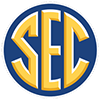SEC Commissioner Greg Sankey on SEC Officiating
In his book, Gridiron Genius, NFL executive, analyst and author Michael Lombardi offers this summary of football, "After is all said and done, football is really a game of surprises."
And yet, in this game of surprises, we ask for perfection.
Perfection from our coaches and student-athletes, and perfection from the game officials who are called upon to instantly apply the rules in real time on every play.
The Southeastern Conference is entrusted with supporting an officiating program that is responsible for calling the games of our member schools. We take this duty most seriously.
We view perfection as our desired goal while also understanding it will always be an elusive standard in a game that is filled with surprises. And we are disappointed when we don't get it right. Because our goal is to get it right, every time.
While officials have always faced scrutiny, the effect has been intensified in recent years with the evolution of high-definition televisions and the ability to view super slow-motion replays from multiple angles on screens of all sizes and via replays shown on monster, crystal clear in-stadium video boards.
The rules of football permit us to utilize modern technologies to review some, but not all, officiating calls. And while some calls are overturned, we know from our extensive review of all game films that our officials get the call right in the vast, vast majority of situations. SEC Football Officials are dedicated to their work and approach each game with integrity and focus on fairly administering the competition.
But mistakes occur, and when errors happen, the next questions are, "What happens now? Where is the accountability?"
SEC officials are held accountable for the overall body of their work and the work of their officiating crew, which is reviewed on a weekly basis throughout the season and on an annual basis.
Ongoing performance evaluations are used to determine game assignments, postseason assignments, compensation levels and ultimately, whether an official is invited to return for the following season. You can learn more here.
In addition, during the season, officials' assignments may be altered based on in-season performance. By protocol, the SEC does not publicly announce these assignment changes.
SEC Bylaws require that coaches and administrators refrain from public criticism of officials, as well as making public comments about any specific communications with the Conference office related to officiating. This is a bylaw that was enacted by unanimous vote of the SEC's member institutions and it is the responsibility of the Conference office to enforce this bylaw by use of private or public reprimands, fines or suspensions.
Although the Conference office does not publicly communicate about personnel actions and school personnel are restricted in their comments about officiating, we have in recent years decided to be more intentional in communicating other matters about the officiating process to all of our audiences:
- We have invited national media to participate as guest officials at spring football games. You can find their perspectives on their officiating experiences in stories linked here.
- We launched a website -- www.secsports.com/officiating -- to provide background on SEC officiating, including an in-depth look at how we recruit, train, assign and evaluate SEC officials.
- We created a Twitter account -- @SECOfficiating -- to educate and inform fans about officiating. We view it as a tool for additional perspective on officiating and rules applications, but as I said when we introduced this account, we have no intention of tweeting all day on Saturdays about individual calls.
- Veteran SEC official Matt Austin moved into the TV studio to offer expert analysis and rules interpretations in real-time on game days. Matt is not an employee of the SEC and is able to provide his independent perspective through various ESPN platforms, but primarily through the SEC Network. The SEC was the first conference to have an officiating analyst specifically assigned to its conference network.
I hope you will take advantage of these resources to gain a better understanding about the SEC Officiating program as we all continue to seek elusive perfection in this game of surprises that we love -- college football.
